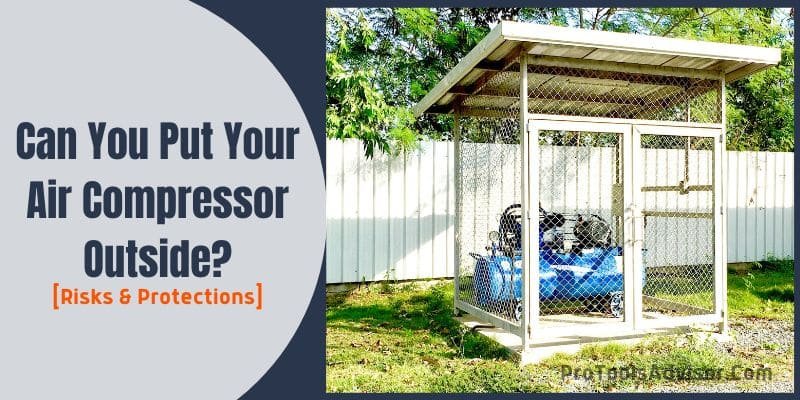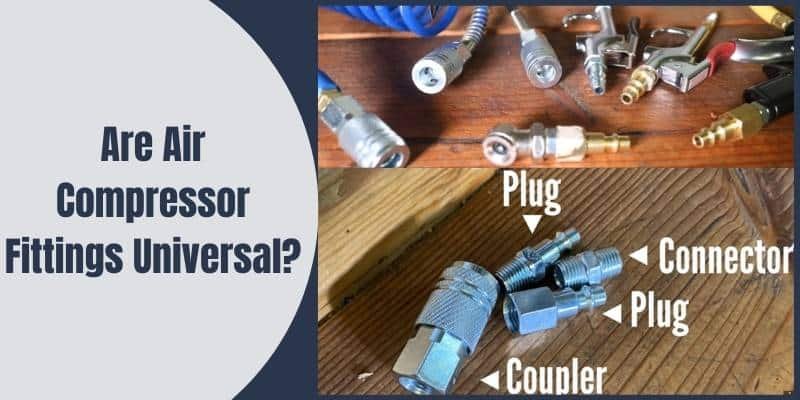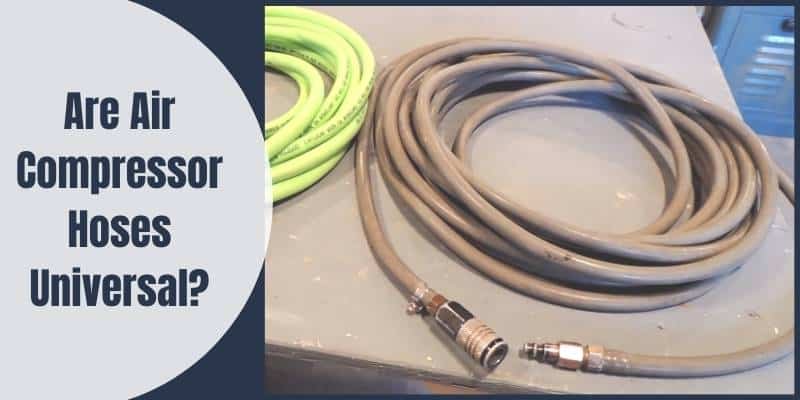Disclosure: This post contains affiliate links and I will be compensated if you make a purchase after clicking through my links. Learn More
Air compressor is quite loud and annoying. It can lead to numerous distractions and productivity losses. Keeping it outside seemed to be the best solution. It will make noise, but you will not hear it. Sounds easy, doesn’t it?
However, there is a catch. Don’t overlook the other side of the picture. Before you decide to do so, consider machines safety first.
Putting the air compressor outside might have a significant impact on its efficiency. It will be exposed to water, dust, and harsh weather conditions. Excessive cold can cause the pipes to freeze, whilst excessive heat will force them to expand. That is why you should never leave your air compressor unchecked outside.
Still, if you are reluctant to keep the air compressor inside, don’t worry. We have got you covered. Below we have discussed the factors that may impede the functionality of your machine and how you can prevent damages.
Sounds good? Let’s get started!

Can You Put Your Air Compressor Outside?
What we have mentioned in the above section, is just the tip of the iceberg. To finalize your decision, we want you to get a proper insight into the situation. Let’s look at how the elements can negatively affect your air compressor’s efficiency first.
Temperature
41 to 95 degrees Fahrenheit is the optimum temperature range for an air compressor. If the weather goes colder or hotter than this, chances are you will have your air compressor malfunctioned.
But why does that happen?
Well, extreme cold can hinder the smooth air transportation within the pipes. The condensed air stored inside the compressor might get frozen. Such condensate will not flow without a hassle.
Moreover, some parts of the receiver tanks might also contain moisture. Those substances may become rock hard at a low temperature. As you can already guess, it will shrink the existing volume of the pipes and hoses. It won’t be surprising if the whole area gets ice-blocked. The machine will fail to provide pressured air as per demand due to such blockage.
The opposite happens during a hot summer. According to the laws of thermodynamics the pipes and hoses will be expanded. As the air flows through those pipes, it loses the initial pressure or condensed form due to the expansion of the pipe’s inner surface.
It means, the air you are receiving through the other end will not be in the same form as before. You can’t use it to fill tires or do other industrial work. The whole purpose of the air compressor will fail during such hot weather.
Moisture
Moisture and machines don’t go hand in hand. It can be any machine including the air compressor. Air compressors come with a drain tank for this purpose. Even when you keep the machine inside the workplace, it may not avoid moisture build-up completely. Sometimes air can turn into steam or forms water droplets.
The purpose of this special tank is to suck the moisture up and keep it collected. Once the limit is reached, the water drains away from the air compressor. Then what’s wrong if we set it outside? The problem is temperature. When temperature and moisture mixes up, it’s a disaster for the unit.
Even if the tank collects water, too low temperature will freeze it up. As a result, it will be difficult to drain it smoothly. The opposite happens in summertime, the water can get vaporized and escape the tank.
Keep in mind that, these are the effects only when you leave it outside unprotected. We normally keep the temperature of the workplace tolerable by using a heater or air conditioner.
Debris
Debris is the deadly enemy of any machine. The possibility of debris is higher if the weather in your local area is mostly windy. Also during rainstorms debris will fly over to the compressor and get stuck inside.
It can create a blockage inside the pipes. Dust and dirt can shrink the holes of air valves or filters causing a reduction in airflow. That means you have to wait a lot longer than normal for the cylinder to fill up.
How to Protect the Air Compressor Outside?
Despite all those risks and downsides, you may still decide to keep your air compressor outside of the workstation. May be a lack of space or the buzzing noise leaves you with no other options
Below we have shared some practical tips that you can apply and protect the air compressor from elements. We have divided our discussion according to different seasons so that you know which technique to apply during a particular time of the year.
During Winter
Use of Heaters
41 degrees Fahrenheit is the ideal temperature. However, depending on where you live, this temperature can fall below this limit during a harsh winter. We don’t see the effects as much when we use a heater to heat our homes or workplaces. However, there is no such shield to protect the compressor. What you can do is place a heater next to it. Make sure the temperature does not fall below the ideal level.
Another thing is to wait a little bit before turning it on during such weather. It’s because the compressor won’t get heated up instantly. It will require some time. If you don’t wait for it to reach the perfect temperature, it might fail to operate smoothly.
Insulating Hoses/Pipes
Insulating the pipes is an excellent way to keep the air from freezing. Assume you placed a heater next to the compressor. The machine runs smoothly and without hiccups. It’s now time to deliver the condensate to the receiving end via the underground hoses/pipes. That’s when the mishap occurs.
During the winter, the earth gets super cold. The extreme cold around the pipes most of the time causes them to freeze up as the air travels through them. And, gradually, it causes a blockage. That’s why insulating the hoses before winter is so important. In this way, the ground won’t have a direct connection with the pipe. No matter how cold it gets, the air flowing through it won’t feel anything.
During Summer Heat
Better Ventilation
All compressors include a built-in venting system. During the summer, the pressure on these ventilators can be extremely intense. Extra air dryers or filters can be used to vent out the heated air.
Heat is produced as a byproduct of air compressors. Overheating is hazardous to the interior components. That is why it must be filtered as soon as possible. Otherwise, the heat will continue to rise and the machine will shut down at some point. To avoid this from happening, make sure you have an adequate ventilation system installed.
Increase Oil Inspection
Lubricants aid in the effective operation of air compressors. There is less friction, noise, and heat waste when proper lubricants are used.
However, excessive heat can cause the oil to degrade and lose quality. Check the oil level every three months. During the summer, though, the oil level will fall faster. The process will come to a halt if you do not replace it with new oil. That’s why you should check the oil level weekly and make sure the quality of the lubricant is maintained.
During Rain/Storm
Frequent Maintenance
Regardless of the season, maintaining the air compressor is crucial. Especially during rainy or windy weather things can get worse very easily. Raindrops might be pushed inside the chamber by the strong wind. It has the potential to accelerate corrosion in metal components.
During a storm, you must clean the ventilators and remove any dirt or debris that has accumulated. Make sure to inspect it at least once a week. Apart from that, try to drain the condensate on a regular basis.
FAQs:
Is It Okay to Leave an Air Compressor in The Rain?
It is dangerous for the air compressor to be left in the rain. The splashes of water will damage the internal parts or make them rusty. Don’t forget the attack of debris too.
Read this article about how to prevent air compressor tank from rusting?
Where Should You Set the Air Compressor?
We recommend setting the air compressor inside the work area. The area should have the ideal temperature range during summer and winter. This is the best place to put air compressor. You can try to install an extra air heater or dryer to make it suitable for operation.
Can You Put the Air Compressor in The Garage?
Yes, it is a very common practice to keep the air compressor in the garage. If it’s dry and warm inside the garage, the machine will work fine. Before setting it up, make sure the inner chambers don’t have any moisture in them.
Final Words
Putting the air compressor outside may appear to be a simple option. But this should not be your first priority. We strongly advise you to install the compressor inside the workstation. However, not everyone has a large enough room for this. In that case, you can follow this guide and take the necessary precautions. Hopefully you will be able to protect your air compressor from changing weathers, enjoy maintaining and utilizing it outside for many years to come.


